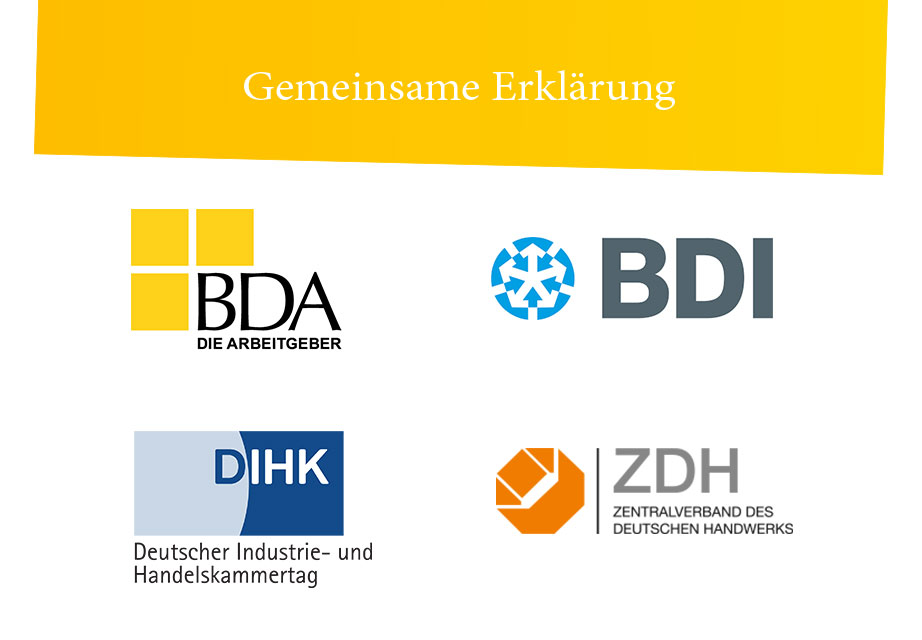- TOPICS
-
-
- Employment and Labour Market
- Labour law and collective bargaining policy
- General applicability
- Industrial action
- Labour & collective bargaining law
- Working time
- Time limit
- Works Constitution
- Bureaucracy reduction
- Data protection
- Protection against discrimination
- Parental leave
- Posting
- Insolvency
- Protection against dismissal
- Minimum wage
- Co-determination
- Mobile work
- Maternity protection
- Pandemic
- Care time
- Self-employment
- Tariff autonomy
- Collective Bargaining Agreement
- Collective bargaining unit
- Tariff policy
- Collective bargaining
- Collective agreement
- Part-time work
- Restructuring
- Holiday law
- Contracts for work
- Whistleblowing
- Temporary work
- Education and vocational training
- Training market
- Professional orientation
- Education policy
- Education 4.0
- Dual education
- dual study
- Permeability
- Early childhood education
- Higher Education Funding
- Lifelong learning
- Teacher Education
- Reorganization of education and training
- STEM Professionals
- Economic education
- Accreditation/Quality assurance
- SCHOOLBUSINESS Germany
- Digitalization and innovation
- Europe and International Affairs
- Social policy and social security
- Old-age poverty
- Work made in Germany
- Occupational safety
- Contribution and registration law
- Company pension scheme
- Shortage of company doctors
- Health insurance
- Long-term care insurance
- Mental health
- Pension insurance
- Riester pension
- Social self-government
- Social insurance
- Accident insurance
- The future of social security
- Taxes & Finances
- Economy & Society
-
-
-
- Newsroom
- The BDA
- Members

Shaping efficient, practical and modern rules together with the business community!

Bureaucracy analysis by BDA, BDI, DIHK and ZDH on the occasion of the 15th anniversary of the NKR
Over the past 15 years, the Normenkontrollrat has worked tirelessly to promote better regulation. And it will continue to be needed in the future. The Corona pandemic has revealed what the business community still considers to be inflexible and slow, and where there are unnecessary and impractical regulations.
Businesses and companies need rules that can be implemented and whose purpose is formulated in a comprehensible way. In addition, it is important to use the enormous relief and modernisation potential of digital offers and solutions, which have enabled companies greater flexibility in opening hours during the Corona pandemic, for example.
The BDA, BDI, DIHK and ZDH have taken the anniversary of the Normenkontrollrat as an opportunity to put the level of regulation in Germany to the test.
The prerequisite for unbureaucratic procedures is the participation of the business community, says DIHK President Peter Adrian: "It is important to involve the business community in the legislative process at an early stage so that regulations can be made more effective, more practical and more modern. To this end, however, business organizations need appropriate feedback periods on draft legislation. No one can realistically provide information on the practical effects in companies if only one or two days are allowed for comments on draft legislation. Unintended effects of a law on business practice would also be revealed by a practice check at an early stage. In this way, procedures could be streamlined and unnecessary new obligations for companies avoided. Together with the Standards Control Council, we would like to work even more successfully in the future to avoid unnecessary burdens for companies."
BDI President Siegfried Russwurm puts the focus on speed and efficiency: "Excessive bureaucracy inhibits entrepreneurial activity, innovation and urgently needed investments. More than ever, an efficient, uncomplicated and reliable legal framework is essential - especially for a successful economic recovery after the Corona crisis and for achieving the climate targets. Central to maintaining competitiveness and investment are streamlined planning and permitting processes and, where legal review is sought, speedy court proceedings. This is also a prerequisite for realising the construction of wind farms, power lines or electrolysis plants more quickly. The minimum principle of 'one-in, one-out' should be extended by politicians to European regulations. A fourth red tape reduction package is needed to simplify and improve existing regulations."
ZDH President Hans Peter Wollseifer focuses on practical relevance: "Craft enterprises expect the state to act in a practical and unbureaucratic manner. Fast procedures, simple and understandable language and comprehensible decisions must become a matter of course for politics and administration. Especially for small businesses, a cooperative and service-oriented administration is a real support. The federal, state and local governments must put the practicability of their regulations to the test and gear administrative implementation more closely to the reality of life in businesses. New regulations must be designed from the outset to be practical and comprehensible. Ideally, all laws should be subjected to a compulsory practical test and cross-check by practitioners in day-to-day operations before they come into force, in order to create realistic laws and uncover absurd regulations. Why, for example, does a bakery have to keep paper records when the electronic cash register already contains all the data? Overregulation, incomprehensible regulations and disproportionate requirements tie up company resources and inhibit development potential. Craftsmen and women are spending more and more time at their desks working through the bureaucratic requirements instead of being in the workshop or with the customer. It is incumbent on the future federal government in particular to provide appropriate impetus and ensure the urgently needed relief."
BDA President Rainer Dulger pleads for a more modern administration: "Germany must finally become simpler. It won't help us if individual administrative services are digitised and we end up with a federal digital patchwork. What we need is the big bang, a digital awakening throughout the country. The completely overgrown bureaucracy is like a brake on the competitiveness of our economy. Unnecessary reporting and bureaucratic obligations prevent companies from providing innovative products and services and creating jobs. We cannot afford this. Administration should support business and citizens, not hold them back. Entrepreneurial activity needs an administration that is a fast, effective and reliable partner. Reducing bureaucracy secures prosperity and jobs - without costing us much. The new government must therefore continue to reduce bureaucracy and relieve the burden on businesses."
The BDA, BDI, DIHK and ZDH appeal to those in Germany who wish to assume responsibility in the next federal government to make progress in these fields, to support the NKR in its work and to take up its suggestions. Germany must be prepared for future crises and make use of the potential of innovative minds, decision-making mentality and entrepreneurial spirit.
The detailed analysis "Three fields of action for a modern and lifelike regulatory framework" with proposals for reducing bureaucracy by BDA, BDI, DIHK and ZDH can be found here enclosed.






